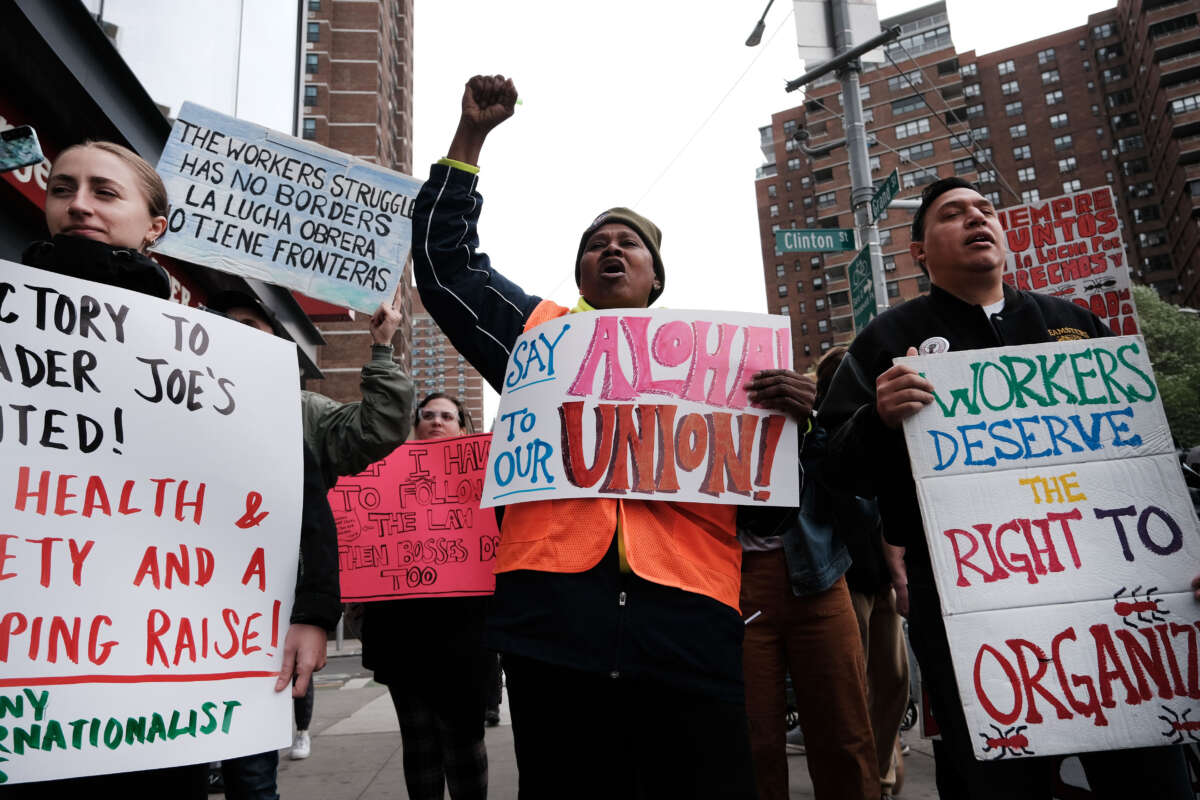Trader Joe’s workers in New York City may be getting a second chance at forming a union after their election failed with a tied vote earlier this year, thanks to a groundbreaking new rule handed down by federal labor officials last week.
Trader Joe’s United, the independent union that has unionized four Trader Joe’s locations across the country so far, filed a request for a bargaining order with the National Labor Relations Board (NLRB) on Monday under the new guidance.
The union is likely the first to seek such an order under the rule, known as the Cemex standard. If granted, Trader Joe’s would be forced to recognize and bargain with the union at the Essex Crossing Trader Joe’s, located in Manhattan.
“We are thrilled that workers at the Essex store have this opportunity for union recognition under the new Cemex ruling,” the union said. “Cemex is a groundbreaking decision that will help workers across the country, including Trader Joe’s crew members, exercise their right to organize without unlawful interference from their employer.”
On Friday, the NLRB issued a new rule that lends a major hand to unions facing union-busting employers in organizing campaigns. Under the rule, an employer would be forced to recognize and bargain with a union if the company committed enough illegal activity to warrant a union election’s results being ruled invalid after a majority of workers had previously favored the union when filing for an election. The ruling is retroactive, meaning that it could apply to cases that happened prior to the ruling.
The union argues that the Essex Crossing election falls under these conditions. Before the company began interfering with the union election effort, the union says, a majority of workers had favored the union — but the company swooped in with a union-busting campaign and eroded that support.
“The union went in with well over majority support, and it’s clear that we lost votes because of these [unfair labor practices],” said Seth Goldstein, an attorney for the union.
In the charge, the union says that the company illegally forced workers to attend captive audience meetings where they were force-fed anti-union propaganda. The company also barred workers from being able to post and distribute union fliers in the break room, the union says.
Ultimately, workers voted 76 to 76 in the election, failing to give the union the majority it needed to win. If their filing is successful, however, Trader Joe’s may be forced to recognize their union under a bargaining order, one of the strongest actions the NLRB can take in enforcing labor law.
“The intensity of an employer’s union busting campaign can be hard to understand unless experienced firsthand,” the union said in a press release. “Threats, coercion, interrogation, and blatant misinformation, along with pitting workers against each other, are all par for the course when an employer wants to stop worker power in its tracks.”
“These kinds of tactics were a significant factor in the Essex election, but Cemex has leveled the playing field and given Essex workers a new opportunity for unionization, despite the employer’s blatant union-busting,” the union continued.
Join us in defending the truth before it’s too late
The future of independent journalism is uncertain, and the consequences of losing it are too grave to ignore. We have hours left to raise the $12,0000 still needed to ensure Truthout remains safe, strong, and free. Every dollar raised goes directly toward the costs of producing news you can trust.
Please give what you can — because by supporting us with a tax-deductible donation, you’re not just preserving a source of news, you’re helping to safeguard what’s left of our democracy.
